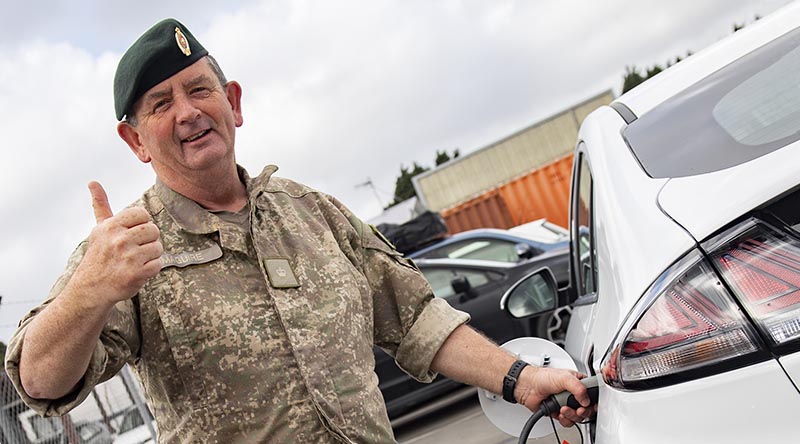NZDF begins electric fleet-vehicle trial

The New Zealand Defence Force has taken a major step towards reducing its carbon bootprint by purchasing its first electric vehicle and installing EV charging stations at Trentham Military Camp.
CAPTION: Trentham Camp Commander Major Jim Maguire plugs into the new charging station on camp. NZDF photo.
The Hyundai Ioniq will join the fleet at Trentham, where the two Delta 7kW slow-charging stations are also available for personnel to charge their private EVs.
This is part of the NZDF’s wider programme towards a more sustainable operation, which fits with the NZ government’s drive to put more EVs on the roads.
Defence Estate and Infrastructure Sustainability Manager Lee Bint said the Trentham trial would help determine the most appropriate type of charging station and guide the use of EV charging stations at other NZDF sites.
“The Trentham pilot was part of the Defence Force’s sustainability roadmap Tuku Iho, which means “to pass on what you’ve received in at least as good as, if not better than, what you receive it in”, Dr Bint said.
“The Defence Force is one of the biggest employers and landowners in the country. As such we have huge responsibility to look after our people, buildings, land and taonga.
“From electric vehicles to efficient buildings, environmental stewardship and looking after our people’s growth and embracing our bicultural heritage, we want to make sustainability part of everything we do.
“We are soon to adopt a roadmap where sustainability is part of business-as-usual operations.
“NZDF estate includes 81,000 hectares of land (bigger than Tongariro National Park), 5000 buildings and thousands of vehicles, so we can potentially make a massive contribution to reducing the country’s carbon footprint.”
Trentham Camp Commander Major Jim Maguire said a survey had shown there was good support for the charging stations.
“A lot of our fleet vehicles are doing short trips around Wellington and EVs are perfect for that,” Major Maguire said.
“Army is adopting new technology all the time and this trial will see how EVs can be used efficiently for our tasks while lowering our carbon footprint.
“A lot of our staff are looking at buying their own EVs and having the charging stations on camp is an incentive because it offers them more flexibility about when they can charge up.”
NZDF is already trialling four electric utility bikes for their suitability for use in the field, and electric carts are used at a number of bases.
The Royal New Zealand Air Force is also replacing diesel passenger stair units with fully electric units at air bases around the country.
This week is International Drive Electric Week.
.
.
.
.
.
.

.
.






Regrettably the NZ is not a Combat force and what happens when electric power is not available ie in combat!